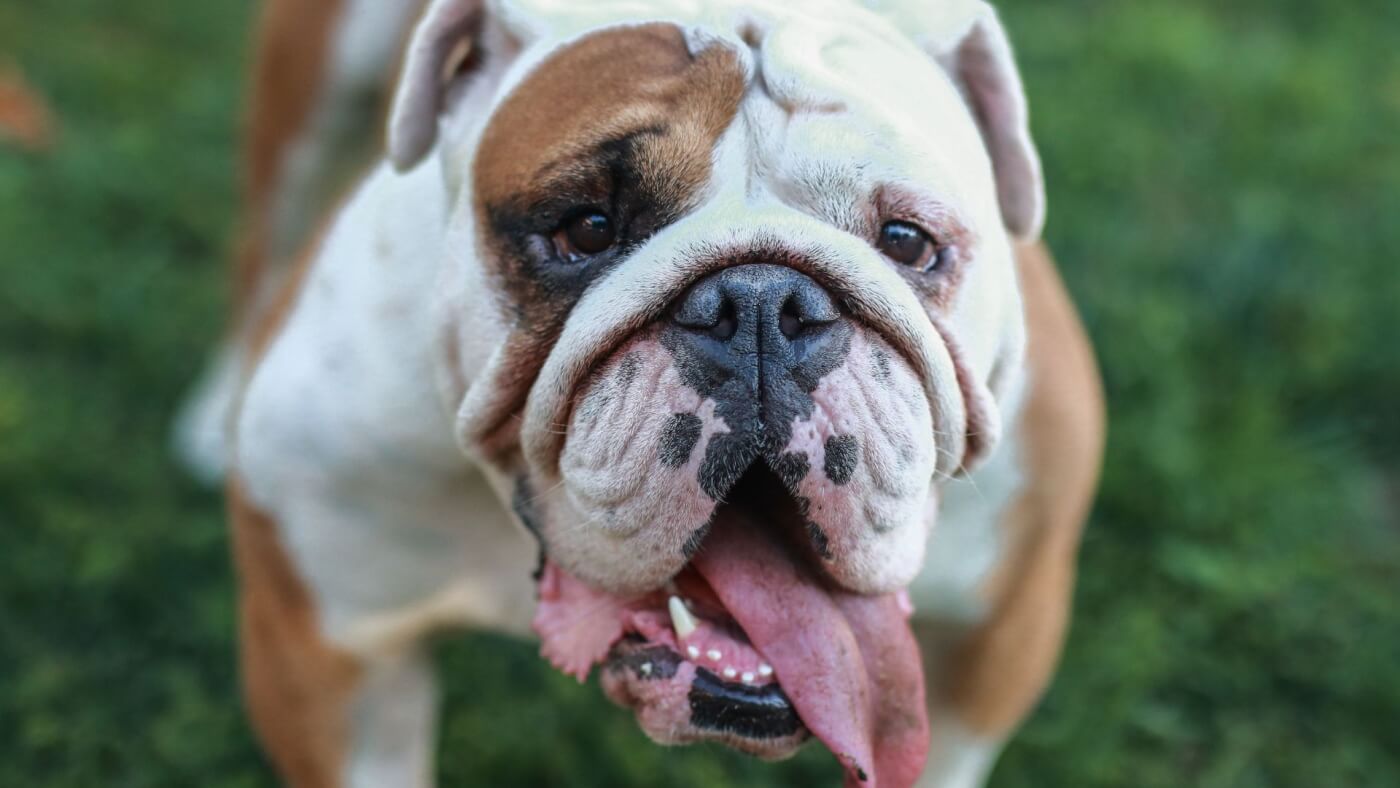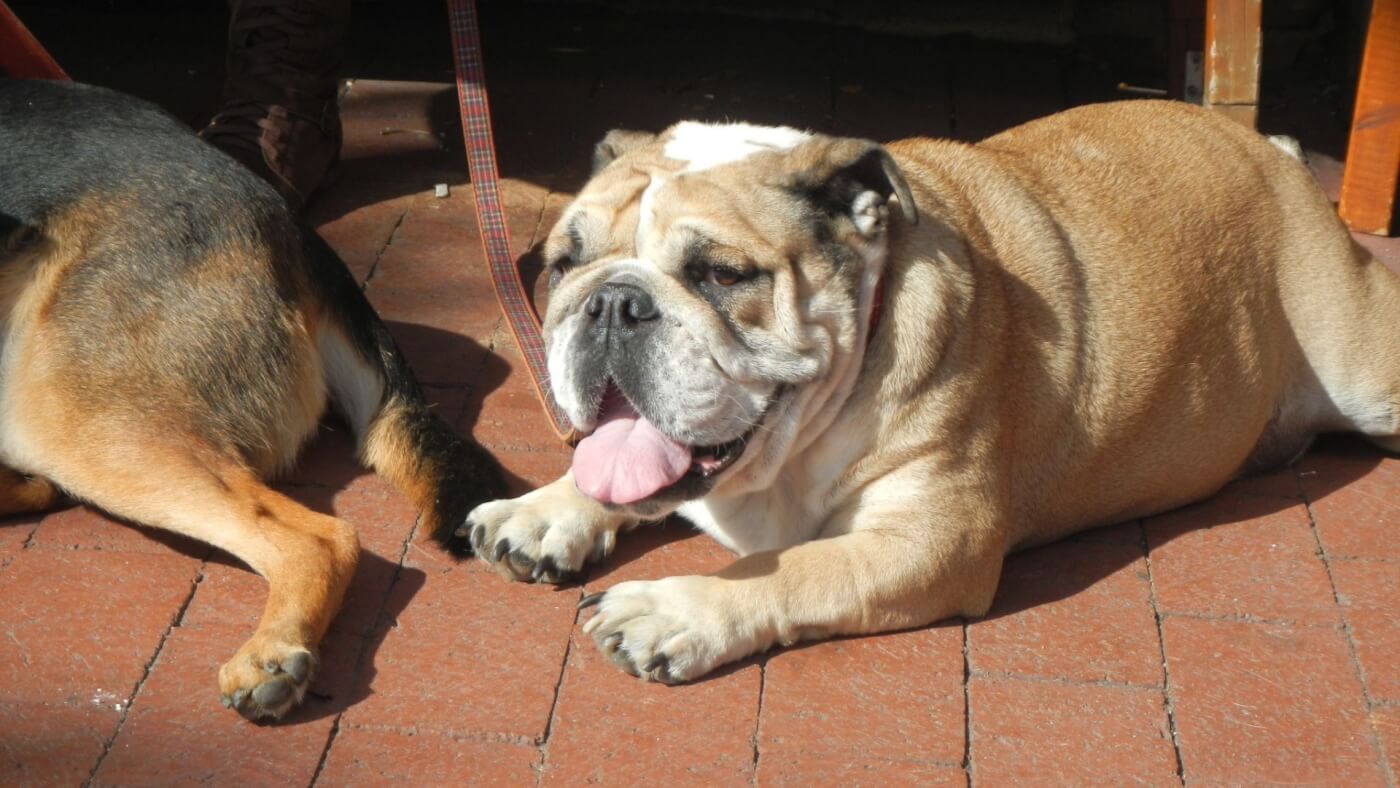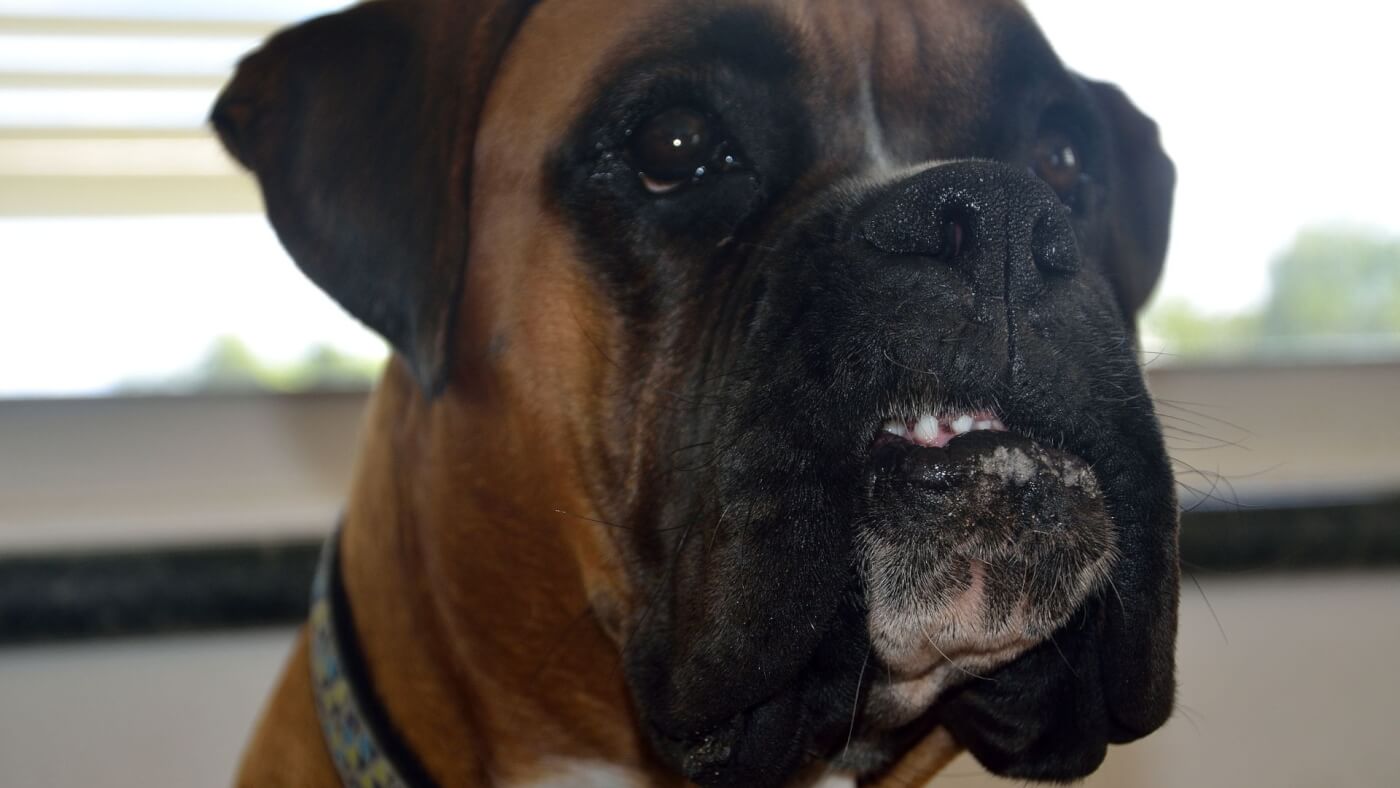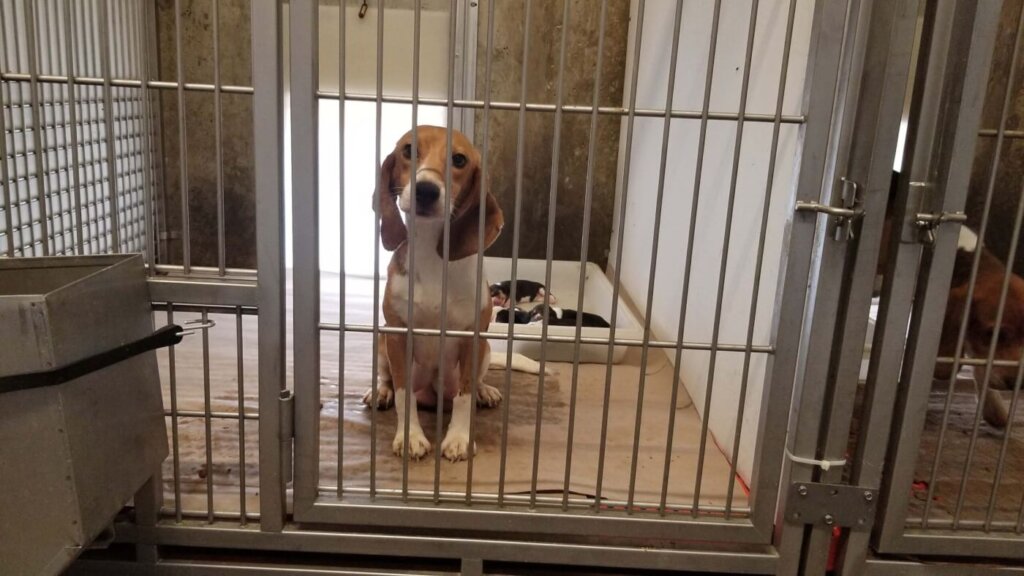
Why Breeding and Buying Bulldogs and Pugs is Cruel
Dogs pay with their health, happiness, and lives for humans’ obsession with breeding and buying them based on their appearances. All “purebred” dogs suffer from genetic conditions that can cause pain, discomfort, and debilitation. Many face lifelong disabilities, ailments, and premature deaths because humans have inbred them and bred them to have grotesquely distorted physical features, such as flattened faces.
French bulldogs, English bulldogs, pugs, Pekingese, Boston terriers, boxers, Cavalier King Charles spaniels, shih tzus, and other flat-faced dogs are breathing-impaired breeds (BIB). They are afflicted with an uncomfortable, debilitating, and sometimes fatal condition called brachycephalic syndrome. It leaves many dogs struggling just to breathe and is the leading cause of death for bulldogs. Going for a walk, chasing a ball, running, and playing—the things that make dogs’ lives joyful and fulfilling—are impossible for many BIB dogs.

A study published in the Journal of Comparative Pathology notes that “affected dogs may have little or almost no activity because they are entirely occupied with breathing.”
The Australian National Kennel Club, an administrative body for purebred dogs, issues “breed standards” by which dogs are judged. These standards—which mandate that bulldogs, pugs, and other breeds have extremely shortened noses and flat faces—are directly responsible for these animals’ suffering.
“All kennel clubs have to take responsibility that they set those breeding standards, and those standards have become so insane that these dogs are struggling,” veterinarian Dr. Scott Miller said. “They’re in pain, they’re uncomfortable and in a lot of cases, they need surgical correction to be normal.”
Recognising how cruel it is to doom dogs to suffer and die for nothing more than humans’ arbitrary aesthetic preferences or the latest fad, Norway has banned the breeding of bulldogs and Cavalier King Charles spaniels. Austria, Germany, and the Netherlands also restrict the breeding of dogs with deformities that cause pain or distress. (Appropriately, Germany calls these dogs “tortured breeds.”) All countries should follow suit, and people who care about dogs should never perpetuate their misery by buying these—or any—dogs from breeders or pet stores.

Short Noses, Long List of Problems
BIB dogs have been bred to have snouts that are shortened and pushed so far back against their skulls that there isn’t enough space to accommodate their normal anatomical features. This causes dogs to suffer from an array of distressing and painful symptoms, including laboured breathing, snorting, snoring, coughing, gagging, retching, vomiting, tiring easily, collapsing, and fainting. Over time, brachycephalic syndrome can cause secondary problems, including inflammation of the airways and strain on the heart from struggling to breathe.
Here is just a partial list of the many health problems caused by breeding dogs for flat faces.
- Stenotic nares: Abnormally narrowed or small nostrils, which restrict airflow
- Extended nasopharyngeal turbinates: Ridges of bone that are covered with tissue that extend into the pharynx, causing airway obstruction
- Elongated soft palate: This tissue may partially block the trachea (windpipe), contributing to difficulty breathing.
- Hypoplastic trachea: A windpipe with an abnormally small diameter, which can constrict airflow
- Everted laryngeal saccules: Sacs inside the larynx turn outward or get sucked into the airway because of increased respiratory pressure resulting from dogs’ difficulty breathing.
- Laryngeal collapse: The larynx (voice box) can’t open as wide as it should because of chronic stress on the cartilage. This can occur in dogs younger than 6 months old, and severe obstructions can even cause death from suffocation.
- Sleep apnea: Some dogs plagued by this problem resort to sleeping while sitting up with their heads propped up or with a ball between their teeth so that they can breathe.
- Heat stress and heatstroke: Because flat-faced dogs can’t breathe well, they can’t cool themselves effectively. Physical exertion, stress, or excitement can quickly escalate into a crisis for these dogs, especially in hot or humid weather or if they’re overweight, as many pugs and bulldogs are—these breeds are prone to obesity. A study by one companion animal insurance provider found that brachycephalic breeds are associated with a more than 100% uptick in claims for heatstroke. According to the U.S. Department of Transportation, BIB dogs are more likely to die on airplanes, comprising nearly half of dog deaths in a five-year period.
- Dental issues: Severe crowding of teeth, bite misalignment, rotated teeth, chronic ulcers, and other problems cause pain and often require extractions. Dental disease causes chronic mouth pain, which makes eating even soft foods painful for dogs.
- Eye problems: Misshapen skulls cause dogs’ eyes to bulge, which can result in infections and corneal ulcers, an inability to close the eyes completely, and even the eye popping out of its socket. These dogs are also predisposed to fur or eyelashes that grow toward the eye, rubbing and irritating it. These conditions can lead to blindness.
- Skin issues: Excessively wrinkled skin is prone to infection and dermatitis.
- Gastroesophageal reflux: Chronic pressure caused by struggling to breathe is thought to be a major cause of gastroesophageal reflux disease. Dogs with this condition regurgitate, gag, produce excessive saliva, and vomit—which can inflame the upper esophagus, pharynx, and larynx.
- Forced artificial insemination: Because of their narrow hips and unnaturally large heads, an estimated 80% of bulldogs are bred using artificial insemination and delivered via Cesarean section.
Greedy Breeders Profit While Dogs Pay Dearly
In light of all the suffering caused by breeding dogs for flat faces, why do breeders keep doing it? Because people keep buying them. The breeding industry is big business, and as long as there is money to be made by selling, showing, and breeding dogs, greedy breeders will keep on producing more—regardless of how much they cause dogs to suffer in the process. Advertisements, TV shows, movies, and other types of media that feature BIB dogs—as well as the celebrities and influencers who purchase them—also drive up demand.

People who buy BIB dogs often find themselves financially and emotionally overwhelmed by trying to manage their many expensive health issues. In one study, one-fifth of brachycephalic dog guardians reported that their dog had undergone at least one surgery related to having distorted physical features. These surgeries aren’t just costly—they’re dangerous, extremely painful, and traumatic for dogs and their human families.
Recovering from surgery is painful and stressful for any dog, but it also carries a high risk of complications for dogs who already struggle to breathe. Indeed, BIB dogs are at a higher risk of fatal complications during even simple, routine procedures. The American College of Veterinary Surgeons notes, “Significant inflammation or bleeding can obstruct the airway, making breathing difficult or impossible.” Some dogs require a temporary or permanent tracheostomy—in which a hole is surgically cut into their trachea and a tube may be inserted—just so that they can breathe.
Even after enduring the pain and distress of surgery and recovery, many brachycephalic dogs still struggle to breathe for the rest of their lives. According to a report from the University of Pennsylvania’s Ryan Veterinary Hospital, “[A]lmost all animals will continue to exhibit some degree of upper airway obstructive signs.”
When people are unable or unwilling to pay for surgery and other medical interventions, BIB dogs suffer even more, deprived of desperately needed veterinary care. Some are relinquished to shelters, given away, sold online to unsuspecting and ill-equipped people, or abandoned.

Dogs Need to Breathe, Not Breed
Humans caused brachycephalic syndrome by breeding dogs—we can’t undo it by breeding more dogs. Studies have shown that bulldogs, for example, are so inbred that there is virtually no way to produce bulldogs who don’t suffer from harmful traits. Even if breeding could somehow fix the problem, it’s unethical to breed more dogs of any kind as long as millions of homeless dogs are waiting in shelters and struggling to survive on the streets.
The solution is simple: Stop breeding and buying BIB dogs—or any other dogs. All purebreds (flat-faced or not) suffer from congenital, often painful conditions. If you have the time, money, patience, and love to care for an animal for life (which could be for more than 15 years), please adopt one from a shelter.
If you already have a BIB dog, commit to making his or her life as fulfilling, healthy, and comfortable as you can—but pledge never to buy another one. Share this information with your friends, family, co-workers, and neighbours. And always have your animal companions desexed and help others do the same.
Animals Are Suffering in Laboratories – Help Save Them Now

